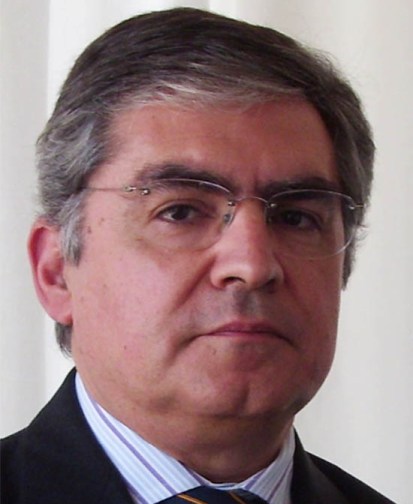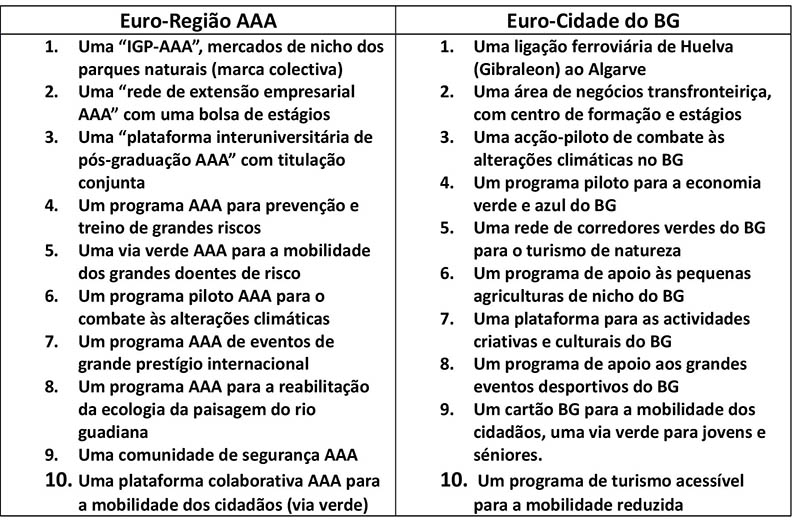 The two Iberian countries joined the European Union in 1986. In 2016, therefore, we celebrate 30 years of European integration and cross-border cooperation.
The two Iberian countries joined the European Union in 1986. In 2016, therefore, we celebrate 30 years of European integration and cross-border cooperation.
The INTERREG program was launched in 1992 and the relationships that Alentejo, Algarve and Andalusia have maintained since then allowed the formation of collaborative networks that ended up being the cornerstone of the AAA Euroregion, created on May 5, 2010, through the tripartite signing of a cooperation protocol.
After these years, the question makes perfect sense: create a Southwest Peninsular Euroregion, involving Alentejo, Algarve and Andalusia, for what?
Let us try to understand the problem to its fullest extent, since all reasons seem to point to inertia and status quo of cross-border relationships that we could characterize as low-cost, low-intensity relationships.
We know that Andalusia has 7,5 million inhabitants, Alentejo and Algarve together just one million. We know that there is a manifest inequality of political-institutional status between the two Portuguese regions and the autonomous Spanish community.
We know that the economic dynamics of Andalusia cannot be compared to Alentejo and Algarve. We know that in 30 years of integration, Portugal has had 15 years of convergence and 15 years of economic divergence.
We know that the period between 2011 and 2015 was an atypical period conditioned by the Troika program, which put cohesion policy and cross-border cooperation on hold.
We know that, at this moment, there is no thought, doctrine and strategy for a three-way adventure in the southwest of the peninsular.
We know, finally, that “a triple A” for the Alentejo, Algarve and Andalusia regions is a “great illusion” and manifestly exaggerated as a proposal for this “young territorial community”!!!
And yet…
We know that proximity cooperation is a relatively inexpensive and abundant resource that can be used intelligently and collaboratively by neighbors.
We know that the intensive touristification of the south of the peninsula deserves more and better joint attention and preventive action to avoid external effects and a negative backflow on the regions.
We know that Alentejo and Algarve are transition regions between the metropolitan area of Lisbon and the metropolitan area of Seville, a corridor that needs to be conceived and organized in a more imaginative way.
We know that the natural parks of the three regions are a valuable asset that must be preserved and valued for the upcoming fight against climate change.
We also know that the three regions, forming part of the European Union's outer border, form a community of collective security, internal and external, which, in the near future, will very likely prevail over everything else.
We know, finally, that the Mediterranean and the Atlantic, after Arab springs, Brexit and the American elections, can have unpredictable geopolitical consequences on the peninsular southwest, all the more reasons to justify the creation of a privileged observation post in this westernmost corner. of the Eurasian peninsula.
To start this long adventure of the south-west of the peninsular and to create the spirit of collaboration necessary for a good working environment among neighbors, I bring to the attention of the citizens of the three peninsular regions a simple work proposal, which is also valid for the Euro-city of Lower Guadiana at a smaller scale and with the necessary adaptations.
Here is my contribution with the promise that I will return to the subject in later chronicles of the peninsular southwest.
AAA Euro-Region and Lower Guadiana Euro-City
Two Action Programs
The main ideas of the two action programs:
– Firstly, it is important to highlight the Alentejo-Algarve as a connecting corridor between the metropolitan areas of Lisbon and Seville and also a link between the Atlantic and the Mediterranean axis;
– Secondly, it is important to discuss the projection of the AAA Euroregion beyond its borders and understand the reflux that this projection can have internally; I am thinking about the projections for the Maghreb Mediterranean, for the North Atlantic (USA and UK), for the CPLP and MERCOSUR; in these projections, we will discover new centralities (for example, the role of the airport in Beja); in the medium and long term, the reality of the south-western peninsular will go through these projections;
– Thirdly, the construction of the “AAA identity” in the future will depend directly on a collaborative platform for the mobility of peninsular citizens in all its aspects and, in particular, on a platform for the creative, cultural and sporting activities of the AAA Euroregion ; I am specifically talking about a green way for young people and seniors;
– Fourthly, it is essential to create a business extension network in the south-west of the peninsula and, correlatively, a technical-business training center that also functions as a professional internship grant for young graduates;
– Fifthly, a pilot program to combat climate change makes sense, with an emphasis on good practices in the circular economy in the fields of application of the green economy and the blue economy;
– Sixthly, an inter-university platform for teaching and research also makes sense, in various technological modalities in person and at a distance, with an emphasis on an Erasmus peninsular programme, joint degrees of higher degrees and joint research programs in the areas of economics green and the blue economy;
– Seventhly, a platform for internal and cross-border security and customs between all security forces, duly accompanied by judicial cooperation and the courts, is indispensable in our times; it is also incumbent here to train and prepare for the prevention and combat of major risks whose frequency and intensity is increasing.
The big problem of decentralized territorial cooperation
The great problem of decentralized territorial cooperation, these days, is called multi-scalarity and multi-level governance, which imply high transaction costs and internal inefficiency in territorial cooperation processes. Otherwise let's see.
Local development associations intervene at the micro-territorial level. Municipalities and their associations intervene at the municipal level.
Regional administrations intervene at regional level through operational programmes.
Cross-border entities intervene at this level through cooperation programs.
National authorities intervene in major infrastructure and equipment.
The European institutions intervene through community initiative programmes. International organizations intervene through bilateral conventions and agreements.
In other words, a problem called “Northeast Algarve”, or Euro-city of the Lower Guadiana or Euro-region AAA is observed from various angles, “sliced” according to these different levels and, if it does not have a mission unit in charge expressing to make this multi-level governance, there is no problem that can withstand the discontinuation of policies and the cacophony and chaos of this administrative labyrinth.
In conclusion, and for all these objectives to be credible, we must fulfill, in my opinion, two conditions: first, to recognize that our peninsular partner will hardly be "the whole of Andalusia", but more modestly Western Andalusia, that is, the provinces of Huelva and Seville, without obviously refusing to cooperate with all the others whenever necessary;
Second, to recognize the need to create an observation post that puts all this ambition within acceptable limits and that is capable of creating a kind of AAA territorial collective intelligence that fits within our most immediate cooperation possibilities.
That's why I suggest that a small AAA mission unit be created for this purpose, which is just the observation post that we so much need. I'll get back to the subject.
Author António Covas is a full professor at the University of Algarve and a PhD in European Affairs from the Free University of Brussels



















Comments